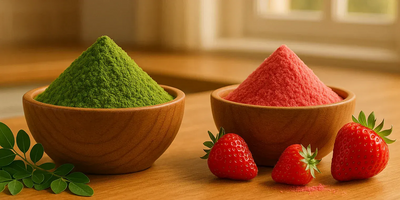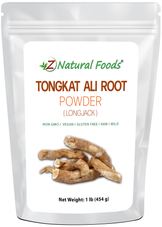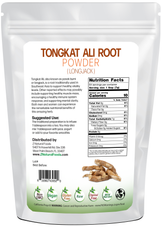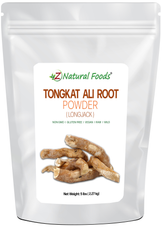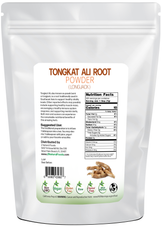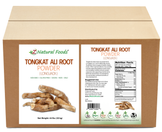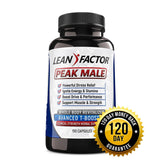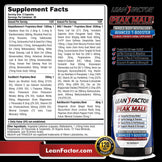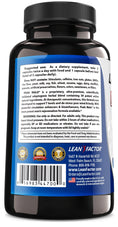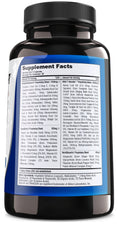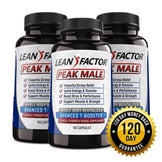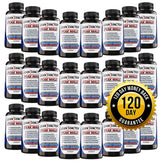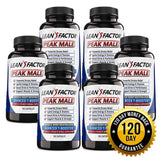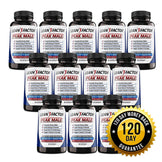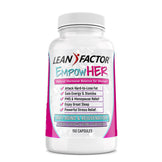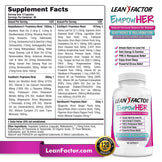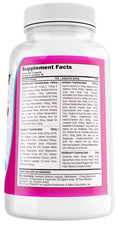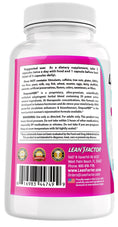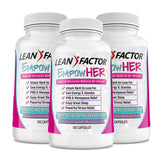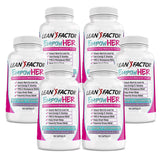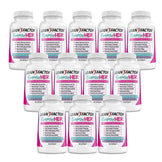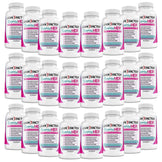Description
Description
One of the greatest fallacies in the world of herbal medicine is how specific herbs develop a reputation regarding their relationship to particular conditions specific to one gender.
This fallacy has misguided people to believe that the opposite gender can’t use that herb.
Is Tongkat Ali just for men?
The reality is that Tongkat Ali does not differentiate between a man's and a woman’s body. It nourishes and supports the human nervous and endocrine systems, allowing for a broad spectrum of actions.
When you take a trip back in time, you learn that the herbs that are considered gender-specific today were, in fact, successfully used for both genders for a very long time.
So, how did this new way of thinking become a reality?
Well, this idea is based on the creation of isolated standardized herbs (or, as I like to call them, natural pharmaceuticals), where it is believed that a specific constituent is what creates the herb's desired effects.
This concept is pure reductionist thinking and limits an herb's potential usage capability.
An excellent example is the herb black cohosh root. Today, the standardized version is touted as a female herb specific to hormone modulation, but, in actuality, the whole root as a full spectrum extract is one of the most underrated nerve tonics that both men and women traditionally used for a long time before herbs were standardized.
Yes, it is true; when you isolate a compound, you can create a more specific targeted approach and result, but it comes with significant pitfalls.
To be clear, this is not to say that there is no place for this form of plant medicine.
It is just important to note that it should not be used as the first line of defense for herbs and does not produce a balanced result.
Whole herbs and full-spectrum extracts are the first line of defense. Ma Haung, aka Ephedra, is an excellent example of how isolating compounds within a plant takes a perfectly safe herb and creates a product with exacerbating effects and, if misused, may have potentially fatal results.
This herb contains ephedrine and pseudoephedrine, which are considered sympathomimetic alkaloids. This plant has been used for thousands of years safely and effectively as a whole herb for lung and sinus issues in Traditional Chinese Medicine.
The reason for Ma Huang’s (as a whole herb) long safety record is that these alkaloids are part of a complex blend of constituents, creating a synergistic and balanced effect. Only when people began creating products using the standardized version that isolated those alkaloids in high amounts did the problems start. Now, Ephedra is banned from the United States market as a supplement.
Unfortunately, Tongkat Ali is one of those herbs where a misguided perception has also been placed regarding gender and usage. Contrary to popular opinion, both men and women can benefit significantly from Tongkat Ali.
Also known as Malaysian Ginseng, Tongkat Ali has a very impressive list of traditional uses.
However, it is best known for its potential aphrodisiac properties and has been shown in human studies to support healthy testosterone levels in both men and women. To be clear, Tongkat Ali has been shown to do this by inhibiting sex hormone-binding globulin, which increases when your testosterone levels are low. When SHBG is inhibited, more free testosterone remains in the bloodstream.
Therefore, two important points should be made about this topic:
- Tongkat Ali’s effects on raising testosterone are less due to actually “stimulating” testosterone synthesis but instead increasing the rate of free testosterone.
- Tongkat Ali does not boost testosterone levels but rather restores and maintains those with low levels.
Remember, women also produce testosterone(around 5-10% of the amount produced in men), increasing passion and sensitivity in their erogenous zone. In both sexes, testosterone supports metabolism, lipogenesis, the formation of red blood cells, and muscle growth.
A pilot study with 12 active men and 13 active women between the ages of 57 and 72 who were given 400mgs of Tongkat Ali extract daily for five weeks looked at Tongkat’s effect on the following parameters: total and free testosterone, dehydroepiandrosterone, cortisol, insulin-like growth factor-1, and sex hormone-binding globulin. The results showed a significant increase in total and free testosterone levels and muscular force in both men and women. It was also concluded that the increase in free testosterone in women is due to the significant decline in sex hormone-binding globulin concentrations.
A preliminary rat study was conducted to see the potential effects that Tongkat Ali has on body and uterus weight and bone markers, which are all associated with hormonal balance. The results showed that Tongkat Ali may be protective and beneficial for hormone and bone markers in women.
Traditionally, Tongkat Ali has been described as being a powerful adaptogen. But, the question that needs to be answered is the following.
Is Tongkat an actual adaptogen or a traditional tonic with adaptogen-like qualities?
Before answering this question, let's quickly review the criteria for defining an adaptogen.
Adaptogens must:
- Be nontoxic at clinical dosage
- Increase the resistance of the hormonal and immune systems to all kinds of stressors through a nonspecific physiological response.
- Normalize body function no matter how external stressors have altered them.
Because many plants not considered true adaptogens can fulfill the above criteria, we have learned that what makes a plant an actual adaptogen is that it must also work through one or both of the body’s master control systems.
1) The HPA Axis (Hypothalamic-Pituitary-Adrenal Axis) is a complex system of neuroendocrine pathways and feedback loops that maintain and support homeostasis in response to chronic stress. The HPA axis is the interface between the endocrine, nervous, immune, digestive, reproductive, and cardio systems.
2) The SAS (Sympatho Adrenal system, aka fight or flight) is a complex system that connects the sympathetic nervous system to the adrenal medulla. In simple terms, it is our fight-or-flight response. A triggered response floods our system with adrenalin and releases hormones epinephrine and norepinephrine from the adrenal medulla. This response increases blood pressure, blood sugar, and heart rate and suppresses digestion. This releasing of hormones and redistribution of blood allows the mind and body to respond and survive.
The following was stated in a randomized control study discussing the effect of Tongkat Ali on the regulation of reproductive hormones in young males. “The lack of changes in luteinizing hormone and follicle-stimulating hormone levels suggests a lesser role played by Eurycoma longifolia in activating the hypothalamic-pituitary-gonadal axis in the young adults. The raised testosterone level may be due to a greater hormone production rate via the hypothalamic-pituitary-adrenal axis.”
Another review discussing Tongkat Ali’s effects on stress hormones and mood states in moderately stressed individuals (32 men and 31 women) stated the following. “Significant improvements were found in the TA group for Tension (−11%), Anger (−12%), and Confusion (−15%). Stress hormone profile (salivary cortisol and testosterone) was significantly improved by TA supplementation, with reduced cortisol exposure (−16%) and increased testosterone status (+37%).” It was concluded that Tongkat Ali is an effective herb, and daily supplementation improves mood and stress hormone profiles.
As impressive as the results and research on Tongkat Ali and the fact that it fulfills much of the criteria, I believe it is slightly premature to call Tongkat a “True” adaptogen. It certainly is a powerful tonic with adaptogen-like qualities. With more studies, I believe this outstanding herb will be added to the concise and distinguished list of actual adaptogens in the near future.
Other potentially positive effects of Tongkat Ali backed by preliminary research
In a rat study looking at the blood pressure-lowering effects of Tongkat Ali, it was shown to be effective in relaxing phenylephrine- (PE-) precontracted rat aortic rings.
In a mouse study looking at the effects of Tongkat Ali on body temperature fluctuation and sleep rhythms, it was concluded that Tongkat Ali extract could be a promising natural aid that alleviates sleep problems via thermoregulation.
Please note that neither of the above effects has been verified by human studies.
So, why can both men and women use Tongkat Ali and get such profound effects?
The reality is that Tongkat Ali does not differentiate between a man's and a woman’s body. It nourishes and supports the human nervous and endocrine systems, allowing for a broad spectrum of actions.
This, in turn, gives the body the tools to create a balanced internal environment that manifests specifically to the individual gender. The stress response creates the same initial chemical reactions in both men and women, like increased cortisol levels. The effects of increased cortisol have a chain reaction that directly affects all glands, which are major hormone producers in the body.
With men being testosterone-dominant and women being estrogen-dominant, the result of this assault on the body manifests very differently.
Another reason for the difference in how the stress response manifests is the individuals' inherent weaknesses. In simple terms, Tongkat Ali or any herb used in this situation with a broad spectrum of effects indirectly impacts the individual's response to the stressor.
In conclusion, at Z Natural Foods, we believe that tradition and science make one hell of a team, and when understanding the proper use of herbs, the whole is greater than the sum of its parts.
Tongkat Ali is undoubtedly an herb that may support both men's and women's longevity, mood, and stress response.
Tongkat Ali has stood up to the scrutiny of modern research and has proven to be an effective tool in supporting good health.
Go here for more information about our Tongkat Ali:

